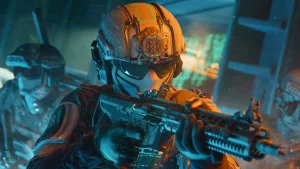Dispatch has a terrific storyline and cast of characters, but the team-based strategy game mechanics built into it is exactly the compelling gameplay twist that Telltale titles were missing. Dispatch is very much a creative descendant of Telltale titles like Tales from the Borderlands and The Wolf Among Us. Fusing a grounded, character-driven focus with a compelling, genre-inspired setting was always the company’s greatest strength, even as the otherwise minute-to-minute gameplay recalled the point-and-click format of older titles like Return to Monkey Island that could become boring after a while.
Dispatch is the first game from AdHoc Studio, which brings a lot of the spirit of the Telltale games to new titles. While they’ve only sharpened their writing skills and gotten better at crafting compelling characters, one of the best surprises of Dispatch is the way it tweaks the gameplay. Instead of sending players to investigate certain rooms and situations amid the dialogue-heavy character interactions, players now manage a team of superheroes and direct them on missions. On paper, it could sound frustrating or repetitive. In execution, it’s a compelling, engaging, and clever way to infuse the characters and story into simple to learn and hard-to-put-down gameplay. It’s everything that was ever missing from Telltale games, and an exciting proof of the developer’s future.
While the real draw of Dispatch is the character-driven storyline, the actual gameplay mechanics involved in sending superheroes out on call make for a surprisingly fun experience. Introduced in the first episode with Robert Robertson taking part in a trial run before taking on a full job at the SDN, Dispatch‘s primary gameplay centers around players directing heroes around a city map in response to sudden emergencies.
The nature of each call varies: sometimes a little girl has lost a balloon; other times, there’s a massive criminal ring making a drug shipment. It’s up to the player to choose which member of their heroic team will tackle the assignment, based on their skill set and personality. Each mission can be complicated by unforeseen problems, forcing players to adapt on the fly and order their heroes to utilize alternate solutions.
Sometimes this works better than others, depending on the skill set of the hero on the assignment — and sometimes, having the right hero on a specific mission will unlock a unique choice that takes care of the matter entirely. Afterward, the heroes return to the SDN for rest, recharging ahead of their next mission. While players are introduced to this mechanic with a squad of seasoned superheroes, the real crux of the gameplay becomes apparent in the second episode when they’re assigned to the Phoenix Program’s Z-Team.
The characters bicker, compete for attention, and sometimes refuse missions outright. The strategy sections are broken up with occasional hacking minigames, forcing players to quickly adapt to code-breaking in the form of button inputs and Pac-Man-style chases against internal security. It’s all very easy to pick up, with players quickly adapting to the format once they’ve gotten used to it. It requires a surprising amount of planning and an innate flexibility to adapt to hero cooldowns and assignments with time limits and unexpected swerves. It’s just the right level of compelling and challenging, and I can’t get over how much I love this approach.
Before coming together under the AdHoc banner, Telltale Games had made a name for itself as modern gaming’s most consistent narrative game developer. Veterans from Telltale Games were key to the founding of AdHoc, which explains why the superhero game has such a strong focus on character and narrative. However, the gameplay was largely focused only on Quick-Time Events and investigation. QTEs also appear in Dispatch, with some of the more active sequences in the game moving in a similar fashion to those titles.
However, Telltale Games otherwise largely focused on classic puzzle game mechanics, a point-and-click model of detection that wasn’t necessarily bad but never all that engaging. It’s the sort of gameplay that can be completed on autopilot while players get more excited to return to the actual narrative beats. Dispatch goes a different direction.
Dispatch leans more into the actual strategy of team management. This is a real boon for the game, fusing a team-based tactical RPG with a business sim to create a surprisingly effective combination. Each hero gains experience while on a mission, with their unique skill sets and attributes making them either an asset or a liability, given the nature of the assignment.
Character dynamics also come into play, but aren’t spelled out for the players, forcing gamers to actually pay attention to the dialogue and interactions so they know who to send out on a mission together and who to keep out of one another’s way. It’s a great little way to incorporate the character focus into the gameplay, ensuring that neither aspect of the title overwhelms the other.
The best compliment to give Dispatch‘s gameplay is that the actual mechanics of sending heroes on missions is just as compelling as the actual well-written superhero narrative. It’s a perfect synthesis of the game’s character focus and some solid, straightforward strategy gameplay. Leveling up increases hero stats and unlocks new abilities for the player to use every session, but failure can get heroes injured or throw one another off.
These mechanics are quickly established in the first two chapters, and only get more complex and compelling in subsequent episodes with the addition of interteam rivalries and friendships. It got to the point where I just wanted more time at the Dispatch desk, increasing the skill set of my assigned heroes, and watching the dynamics develop in real-time. It’s a great combination of storytelling focus with compelling gameplay that never gets more complicated but takes on new layers of complexity.
Choices in the gameplay impact the player’s perspective on the team and their own views on Robert. It’s efficient and effective, all while establishing a fresh way to look at the standard team-based strategy RPG. If anything, I wish Dispatch gave players more opportunity to sit in the chair and continue to grow their team. Although the game currently only has eight episodes confirmed, it’s the sort of mechanic that’s begging for an expansion, whether that be more DLC assignments or a full sequel. Regardless of how gamers get it, I really hope that AdHoc expands on Dispatch‘s terrific fusion of gameplay and story in future titles.
The post Dispatch’s Strategy Game Style Is Exactly What Telltale Was Missing appeared first on ComicBook.com.



